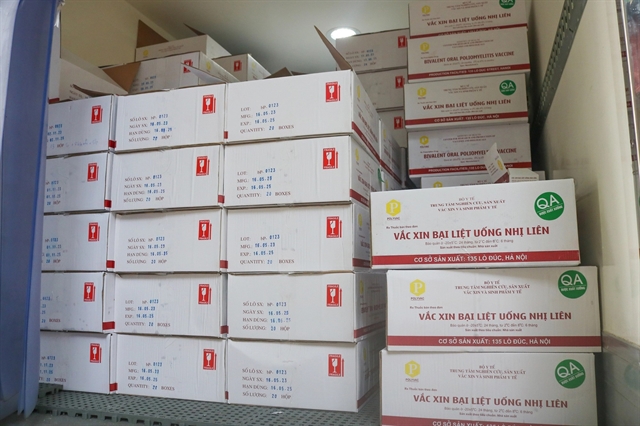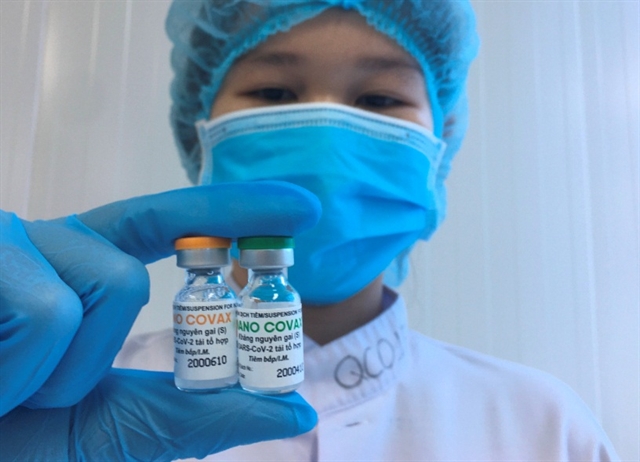 Society
Society

 |
| Việt Nam holds a strong position in the list of vaccine producers worldwide. VNA/VNS Photo |
HÀ NỘI - In recent years, the Vietnamese health sector’s position has been increasingly recognised thanks to outstanding advances in research, development and application of technology in many fields.
In addition to achievements in laparoscopic surgery and organ transplantation, Việt Nam is also holding a rising important position in the list of vaccine producers worldwide, according to experts.
Việt Nam has continuously implemented and perfected the national immunisation system to prevent dangerous epidemics. Statistics of the Ministry of Health show that there are currently about 30 infectious diseases that can be prevented with vaccines.
More than 60 years ago, in the context of difficulties posed by the war, Việt Nam began producing the first vaccine - an oral polio vaccine, as at that time the country recorded a high infection rate of this disease.
Since 1990, the rate of children under the age of one receiving three doses of polio vaccine was maintained at over 90 per cent and this was the premise for the country to eradicate this disease in 2000.
Following the polio vaccine, Việt Nam developed an oral cholera vaccine, from technology transferred by Sweden. In 2000-2001, Việt Nam continued to transfer this technology for free to a vaccine institute in the Republic of Korea (RoK), and an Indian company that held the copyright to produce this vaccine for export around the world.
After that, Việt Nam gradually proactively produced many types of vaccines such as Hepatitis B from human plasma, Japanese encephalitis vaccine and diphtheria, pertussis and tetanus vaccine. In 2005, Việt Nam produced and exported the first 1 million doses of Japanese encephalitis vaccine to India and now the Vietnamese vaccine has been shipped to other countries such as Timor-Leste, the RoK and Myanmar.
Since 2015, Việt Nam has been one of nearly 40 countries to receive the National Vaccine Authority (NRA) Certificate from the World Health Organization (WHO) recognising its eligibility to export vaccines to the world.
Just one year later, Việt Nam marked an important milestone on the world vaccine map when it produced its own high-quality combined measles-rubella (MR) vaccine using Japanese technology. At this time, Việt Nam was one of 25 countries in the world and the fourth in Asia that could produce the MR vaccine after Japan, India and China. Since April 2018, this vaccine has been used on a national scale for children from 18 months old in the expanded immunisation programme.
The year 2018 marked the next major achievement of Việt Nam's health sector when successfully producing a 3-in-1 seasonal flu vaccine (A/H1N1/09, A/H3N2 and B) and pre-pandemic influenza A/H5N1 vaccine.
One of the outstanding achievements of the sector in 2023 was that the Centre for Research and Production of Vaccines and Biologicals (Polyvac) under the Ministry of Health successfully exported 1 million doses of measles vaccine MVVac to India. Previously, the production technology of this vaccine was transferred from Japan and it has been put into use in the national expanded immunisation programme in Việt Nam since 2009.
In February 2024, Việt Nam had a new generation vaccine to prevent meningitis caused by Neisseria meningitidis B.
In addition, Việt Nam has also participated in the production and export of vaccines for animals. In 2022, it was the first country to successfully research and produce a vaccine to prevent African swine fever. In 2023, it officially exported the African swine fever vaccine AVAC ASF LIVE to five countries, namely Indonesia, the Philippines, Malaysia, Myanmar and India.
According to Minister of Health Đào Hồng Lan, Việt Nam has made the best use of advanced technology to produce vaccines to prevent human diseases, ensuring the production of 11 out of 12 types of vaccines to serve the national expanded immunisation programme.
In a speech at the 2023 National Scientific Conference on medical research and application organised by the Việt Nam General Medical Association on last October, Lan stressed that outstanding studies on vaccine production and testing had made Việt Nam a strong country in vaccine production.
Việt Nam eliminated neonatal tetanus in 2005 and is moving toward the goals of eliminating measles and reducing the rate of hepatitis B infection in children under 5 years old to 1 per cent in the near future. VNS




